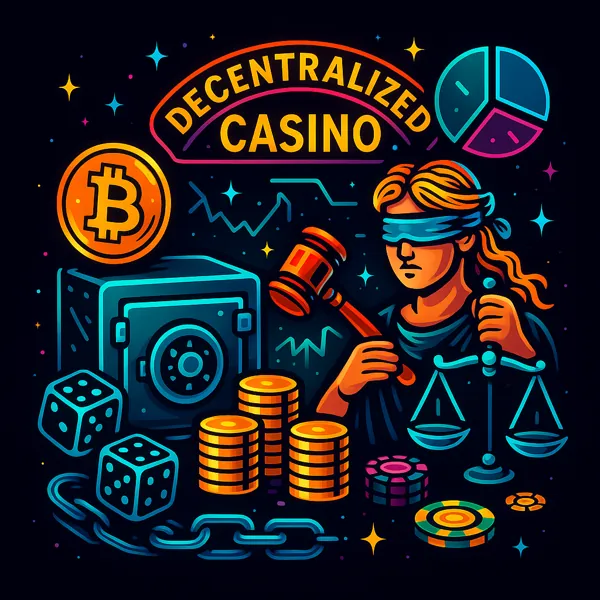Web3 casinos are booming. Billions in bets flow through on-chain games, prediction markets, and crypto sportsbooks every year. For players, it feels like a new frontier: borderless, provably fair, and outside government reach.
But one big question hangs over the industry: will decentralized casinos ever be regulated?
Let’s dive into how regulation works today, what makes decentralized gambling tricky to police, and what the future might look like.
How Traditional Gambling Is Regulated
In Web2 and land-based casinos, regulation is clear:
- Governments issue licenses to operators.
- Regulators enforce rules around fair play, anti-money laundering (AML), and player protection.
- Violations bring fines, bans, or even criminal charges.
Examples:
- The UK Gambling Commission strictly regulates online betting in Britain.
- In the US, Nevada and New Jersey run their own licensing systems.
- In 2022, Flutter (PokerStars, Betfair) was fined £17M in the UK for AML failures.
The model is simple: if you want to run a casino, you need permission.
Why Web3 Casinos Are Different
Decentralized casinos don’t fit the old model. They’re not a company with servers in one country. Instead:
- Games run on smart contracts, deployed on Ethereum, Solana, or BNB Chain.
- Liquidity pools bankroll payouts instead of centralized operators.
- Users connect with wallets from anywhere in the world.
- Many teams are pseudonymous.
Who does a regulator even fine if a protocol has no company, no CEO, and no central servers?
The Case For Regulation
Despite the challenges, governments have strong reasons to regulate Web3 gambling:
- Tax revenue
Billions in volume = billions in potential tax. Governments won’t want to miss out. - Player protection
Scams and rug pulls hurt players. Regulation could push standards for audits, transparency, and custody. - AML & KYC pressure
Regulators fear casinos being used for money laundering. Expect pushback against anonymous, high-volume betting. - Level playing field
Licensed Web2 operators will lobby hard against unregulated on-chain competitors.
The Case Against Regulation
On the flip side, Web3 casinos are hard to police:
- Decentralization
Smart contracts don’t shut down easily. Once deployed, they can run forever. - Jurisdiction problems
A bettor in Brazil can play on a contract deployed by a dev in Vietnam, secured by nodes worldwide. Which country’s laws apply? - Cultural mismatch
Web3 culture values pseudonymity, borderless access, and community ownership — the opposite of strict KYC rules. - Innovation risk
Heavy-handed regulation could push innovation offshore or underground, just like early crypto exchanges.
Likely Scenarios for the Future
- Hybrid Regulation
Front-end websites (the UI players use) may require licenses, while the underlying smart contracts remain open. This is already happening with some dApps geo-blocking US players. - Self-Regulation via DAOs
Communities may adopt their own standards: mandatory audits, transparent house edges, and fair play proofs. DAOs could issue “certifications” for safe casinos. - Global Standards
Just like stablecoins are being discussed by the G20, international talks could set baseline rules for crypto gambling. Don’t expect this soon, but pressure will grow. - Two-Tier Ecosystem
Some casinos will go fully regulated, targeting mainstream players with smooth onboarding and licenses. Others will stay fully degen, no KYC, high risk, high reward.
Famous Clashes So Far
- Polymarket (2022) → Fined $1.4M by US CFTC for unregistered event markets. The site geo-blocked US users but continued globally.
- PoolTogether lawsuit (2022) → Critics argued no-loss lotteries were illegal. Community crowdfunded $1.4M for defense.
- BC.Game & Curacao License → Shows Web3 casinos can choose to operate under lighter offshore regimes to attract users.
These cases show regulators are watching — and picking battles where they can.
What Regulation Could Look Like
If regulators do step in, expect rules around:
- Licensing → Front-ends must apply for permits.
- Audits → Smart contracts need certified third-party reviews.
- KYC/AML → Casinos may require identity checks for big withdrawals.
- Responsible gambling tools → Limits, cooling-off periods, and disclosures.
But here’s the twist: enforcing this on decentralized, wallet-based casinos is way harder than slapping fines on a Web2 operator.
Numbers Behind the Debate
- Global online gambling = $90B+ in 2024, growing 10% yearly.
- Web3 casinos processed $80B+ in bets in 2024 (Yield Sec).
- Crypto gambling traffic grew 50% YoY in LATAM and Africa, where Web2 options are limited.
With that much money in play, regulators won’t stay hands-off forever.
Final Word
So, will decentralized casinos ever be regulated? The short answer: yes — but not in the way Web2 casinos are.
Expect front-end crackdowns, offshore licenses, and pressure for KYC. But also expect underground dApps, DAOs, and anon devs to keep pushing fully degen casinos that no regulator can touch.
The future is probably a split ecosystem: safe, regulated Web3 casinos for mainstream users — and raw, unfiltered degen dApps for the true gamblers.
For players, that means choice. For regulators, it means a headache. And for degens? It just means the game never stops.
Wagmi 🚀


